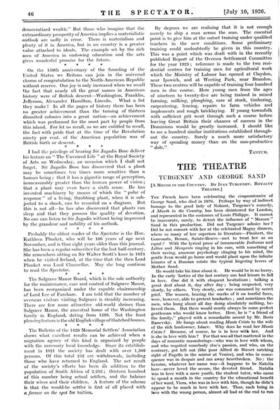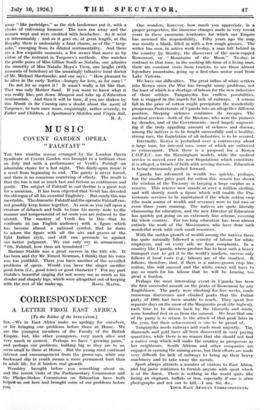THE THEATRE
TURGENEV AND GEORGE SAND [A MONTH IN THE COUNTRY. BY IVAN TURGENEV. ROYALTY THEATRE.]
THE French have been celebrating the cinquantenaire of George Sand, who died in 1876. Perhaps by way of indirect homage to the good lady of Nohant, Turgenev's comedy, A Month in the Country, has been disinterred for London, and represented in the costumes of Louis Philippe. It cannot be inaccurate, surely, to detect the influence of " Maman " Sand in this production. Did not Turgenev admire her ? Did he not consort with her at the celebrated Magny dinners, where so many of her superiors in literature—Flaubert, the Goneourts, Renan, Sainte-Beuve—met to treat her as an equal ? With the lyrical prose of innumerable Indianas and Lelias and Mauprats ringing in his ears, with something of their raving, amorous psychology clinging to his mind, the gentle Ivan would go home and would plant upon the infinite leisures of a Russian estate the typical lingering lovers of Mother Sand.
He would take his time about it. He would be in no hurry. In the early 'forties of the last century one had leisure to fall in love. One did it with eloquent hesitations ; talking a great deal about it, day after day ; being suspected, very slowly, by others. Very slowly, one was consumed by secret grief. The women, bearing the marks of it on tearful faces, were, however, able to pretext headaches ; and sometimes the men, who hung about all day doing absolutely nothing, be- lieved them. But there would nearly always be some perfect gentleman who would know better. Here, he is "a friend of the family," played with a remarkable accent by Mr. Boris Ranevsky. He hangs about reading Monte Cristo to the wife of the rich landowner, Islay's% Why does he read her Monte Cristo? Because, of course, he is in love with her. And is she in love with him ? For that was all that mattered in the days of romantic maunderings—who was in love with whom, and who requited somebody else's passion, and who, on the contrary, got left out (like poor Alfred de Musset catching sight of Pagello in the mirror at Venice), and who in conse- quence was in despair and ran away heartbroken. No: the heroine, whatever her name was—it happens to be Natalia here—never loved the secure, the devoted friend. Natalia was in love with a mere youth, the student tutor, who came to spend a month in the country for the educational benefit of her ward, Viera, who was in love with him, though he didn't appear. to be much in love with her. Thus, each being in love with the wrong person, almost all had at the end to run away "like partridges," as the rich landowner put it, with a stroke of enlivening humour: The -men ran away and the women wept and were credited with headaches. So it went on interminably ; and as it goes on, at great length, at the Royalty there is undeniably a faint charm, as of the " keep- sake," emerging from its diluted sentimentality. And there are a few exquisite moments, a few scenes that move us by virtue of the restraint in Turgenev's methods. One watches the gentle poses of Miss Gillian Scaife as Natalia, one admires the sincerity of Miss Natalie Moya's Viera, one laughs (with moments of boredom) at the amazingly talkative local doctor of Mr. Michael Sherbrooke, and one says : ." How pleasant to be alive in the early 'forties—hungry for love, as for corn ! "
Do not let us regret it ! It wasn't really a bit like that. That was only Mother Sand. If you want to know what it was really like, put down Mauprat and take up L'Education Sentimentak. And then it will be time, if you are shaken by this Month in the Country into a doubt about the merit of Turgenev, to turn once more, enquiringly, rather severely, to Father and Children, A Sportsman's Sketches and Virgin Soil.
R. J.











































 Previous page
Previous page